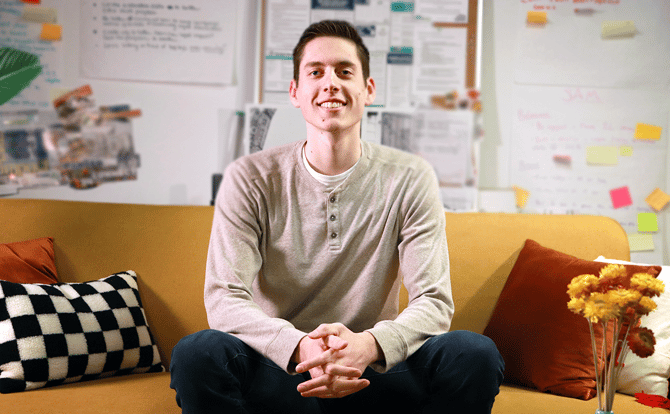Meet Sam Kiel, MCR Extern
February 22, 2024

Michigan Community Resources’ Legal Team occasionally has the opportunity to bring in law students as externs to help support the services we provide to our clients.
In addition to being able to leverage their skills in real work situations, student externs can see the impact of the work of pro bono lawyers on the communities we serve.
In this post, MCR's current extern, Sam Kiel, shares his background and his perspectives on MCR’s Legal Programs and on service to communities.
LET'S LEARN MORE ABOUT YOU. WHAT IS YOUR BACKGROUND?
I’m studying law at Wayne State University right now, but I got my undergrad degree at Western Michigan. I grew up in Frankenmuth and just got married to my high school sweetheart. I play a lot of sports including basketball and soccer. I’m into gaming.
I was asked in an icebreaker once what my love language is, and it was hard to come up with something, but in thinking about it, for my wife and I, our love language is competition. We play volleyball and pickleball together, we go to trivia nights, we just bond over competition.
HOW DID YOU END UP WITH MCR?
I had the chance to take a seminar called "Access to Justice," which is taught by Marilyn Kelly, former Chief Justice of the Michigan Supreme Court. The class would occasionally invite in speakers to discuss different topics.
One of the speakers brought in was Maureen Krasner, who works for MCR, and who I’m now working with as part of my externship. We have to get experiential learning credits, and the externship serves as that.
But I think the thing that made me want reach out was the fact that MCR isn’t just addressing things on an issue-by-issue basis, such as just navigating homelessness, but serves organizations that tackle community needs and are trying to make changes in their neighborhoods.
WHAT STANDS OUT TO YOU ABOUT MCR'S MISSION?
I think the way that MCR empowers the organizations they work with to respond to needs on their own terms is what stood out to me.
In a lot of cases, lawyers can’t always see the needs of the people they work with, and so when you’re just focusing on homelessness, or eviction or whatever, you can make assumptions about how problems need to be solved.
I think with MCR, you’re empowering communities to be responsive to their own needs and allowing them access to legal help, which would otherwise be a huge burden.
WHAT DO YOU THINK PRO BONO LAWYERS GET FROM WORKING WITH MCR? WHAT ARE YOU LEARNING FROM YOUR TIME HERE?
Pro bono work can be very reactionary, in reacting to problems that exist. I think MCR’s proactive approach can help to teach lawyers how to communicate with nonprofits and learn what that world looks like, to help them understand what problems and communities look like more broadly.
I think the biggest thing that lawyers get out of working with MCR is learning nonprofit law more thoroughly, and understanding how it’s different than small business, or corporate law, or even large nonprofits like United Way.
MCR’s work with small nonprofits is really something interesting for me, and I think it’d be interesting to see how diverse the work these nonprofits do actually is.
...
The legal support provided through MCR's Legal Programs has remained a consistent and integral component of our work over our 25 years of history. Connecting organizations with pro bono assistance from attorneys and the expertise of our Legal Team continues to be one of the ways MCR works to create equitable access to resources in the nonprofit sector.
To learn more about our Legal Programs, you can visit our Legal Programs page.
If you are an attorney and are interested in working with organizations doing important work in the community, you can Sign Up to Volunteer.


